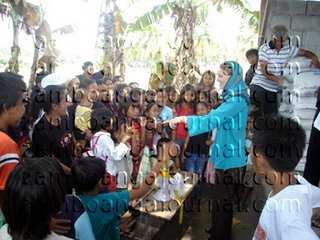

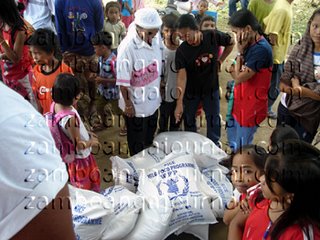



 ZAMBOANGA CITY (Zamboanga Journal / 31 Jul) The website of the outlawed Communist Party of the Philippines (CPP) and its armed wing, the New People's Army (NPA) have disappeared, but the rebel groups continue its propaganda war despite losing one of the most visited site from the Internet.
ZAMBOANGA CITY (Zamboanga Journal / 31 Jul) The website of the outlawed Communist Party of the Philippines (CPP) and its armed wing, the New People's Army (NPA) have disappeared, but the rebel groups continue its propaganda war despite losing one of the most visited site from the Internet.
1: a book printed before 1501 2: a work of art or of industry of an early period
Example sentence: Among the library's archives is a collection of exquisite incunabula. (Merriam-Webster)

 With local elections next year fast approaching, giant billboards of government projects and photos of politicians are all over Zamboanga, but many roads in the southern port city remain dilapidated and without street lights, making it dangerous at night both for motorists and pedestrians. (Zamboanga Journal)
With local elections next year fast approaching, giant billboards of government projects and photos of politicians are all over Zamboanga, but many roads in the southern port city remain dilapidated and without street lights, making it dangerous at night both for motorists and pedestrians. (Zamboanga Journal)
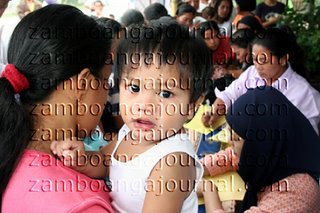
 Christian and Muslim villagers in Zamboanga City during a medical mission on Saturday, 29 July 2006 spearheaded by the Sultanate of Sulu and North Borneo. (Zamboanga Journal)
Christian and Muslim villagers in Zamboanga City during a medical mission on Saturday, 29 July 2006 spearheaded by the Sultanate of Sulu and North Borneo. (Zamboanga Journal)  What the news say when there is war? A paper in Tel Aviv and another in UAE. (Graphics by Zamboanga Journal)
What the news say when there is war? A paper in Tel Aviv and another in UAE. (Graphics by Zamboanga Journal)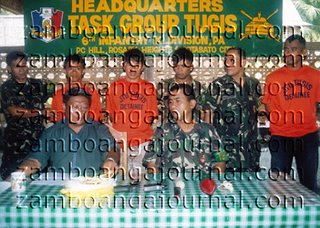
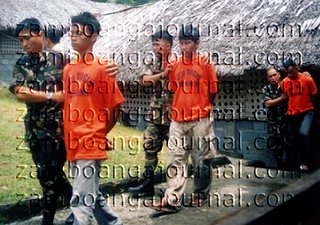 Joint police and military agents under the Task Group Tugis headed by Army Lt. Col. Salvador Calanoy IV (right) and Philippine National Police-Criminal Investigation and Detection Group (CIDG 12) under Supt. Roberto Badian (left) present captured Abu Sofia members. (Mark Navales)
Joint police and military agents under the Task Group Tugis headed by Army Lt. Col. Salvador Calanoy IV (right) and Philippine National Police-Criminal Investigation and Detection Group (CIDG 12) under Supt. Roberto Badian (left) present captured Abu Sofia members. (Mark Navales)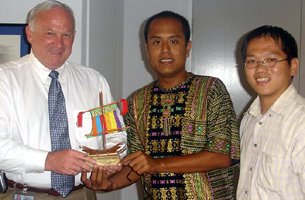
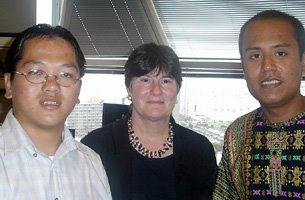 Above, Rafael Derick G. Evangelista III and Alvin G. Hung with San Diego City Mayor Jerry Sanders; and below with US Judge Margaret McKweon.
Above, Rafael Derick G. Evangelista III and Alvin G. Hung with San Diego City Mayor Jerry Sanders; and below with US Judge Margaret McKweon.ZAMBOANGA CITY (Zamboanga Journal / 27 Jul) Unidentified armed men snatched Thursday a Filipino matriarch and her son in the strife-torn island of Jolo, about 950 km south of Manila, a senior army commander said.
Brig. Gen. Alexander Aleo said Jacky Selvin, 58, and Jeffrey Selvin, 27, were seized at around
He said the woman owns a bakery in Jolo. No group claimed responsibility for the kidnapping, but the island is a known lair of the Abu Sayyaf group, blamed for the series of terrorism and kidnappings.
Last month, suspected Abu Sayyaf gunmen freed a kidnapped 41-year old pharmacy owner Bren Vergara after more than two months in captivity after their family allegedly paid more than one million pesos in ransom. The man was snatched April 12 together with his ailing 70-year old mother Caridad Vergara, who had been earlier freed near Jolo town.
Both hostages were tortured by their guards during their captivity in the mountain and the man was beaten so badly to the point that he nearly died. Gunmen snatched the duo outside their pharmacy in downtown Jolo.
The Abu Sayyaf had carried high-profile kidnappings in the past, including a daring raid on the Malaysian resort island of Sipadan in 2000 where it seized 21 Asian and European holiday-makers, and a similar attack on the posh Dos Palmas resort in the central Philippine island of Palawan a year later where militants seized 17 Filipinos and three U.S. citizens, two of whom were later beheaded and killed.
Dr Mohammad Hassan Salem, IDB's head of special assistance, said the grant will be allocated to fund three major social services in the region -- education, health and infrastructure.
He said the assistance is part of the commitment of the 56-member countries, which constituted the Organization of Islamic Conference, to foster the economic development and social progress since the creation of the ARMM following the 1996 peace agreement between the Moro National Liberation Front and the Philippine government.
"The IDB is required to establish and operate special funds for specific purposes including a fund for assistance to Muslim communities in non-member countries such as the
He added the bulk of the bank's special assistance program will be allocated in the provinces of Lanao del Sur, Maguindanao, Jolo and Tawi-Tawi in the Sulu Archipelago.
The project will be focusing more in upgrading Muslim schools and scholarship programs for Muslim students not only in ARMM but other Muslim-dominated areas in the country.
He said the project, which is now being formulated by the national and the autonomous education departments, and the Council of Ulama is expected to teach Muslim students on basic Arabic language, values of Islam, and bilingual education.
To improve health condition in the Muslim region,
The special fund will also use to purchase medicines to be delivered in far-flung areas of the region, and the construction of municipal health stations to some towns where there is no existing health centers.
For infrastructure, the IDB will also use about 40% of the funds to construct bridges, farm-to-market roads, and seaports. He said IDB allocated $1.5 million to provide major improvements and expansion in water delivery service, particularly to those in the islands.
"Infrastructure is very crucial not only for the development of the Autonomous region's local economy but also for social progress," he said.
The autonomous region has been the center stage of the conflict in
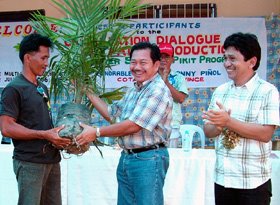
North Cotabato Gov. Emmanuel Pinol hands over an oil palm seedling, as Pikit town Mayor Sultan Sumulong looks on, to a Muslim farmer of Bolod village during a consultation-forum on oil palm farming. (Sidney Nanini)
Pinol met with farmers Wednesday at the
“If you want to graduate from poverty, plant oil palm,” Pinol said, citing Dungguan, M’lang village chieftain Jose Sagadan, whose community has improved following their shift to oil palm farming.
As added support to farmers who would venture into oil palm farming, Pinol said the provincial government would also provide the fertilizer assistance.
“We have all seen what war can do to us. Now that we have been experiencing peace, it is time we move on with our efforts to attain a better life. Oil palm is our way towards that goal, and we are here to help you to the best we can to attain that goal,” he said.
BONGAO, TAWI-TAWI (Darwin Wee / 27 Jul)
Gov. Sadikul Sahali said the project, a joint effort between the Canadian government and Tawi-Tawi, will further boost the seaweed industry. Tawi-Tawi is one of the major exporters of seaweeds in the country.
He said the plant would be put up in the
"This is a dream come true to the province. Sitangkay, which produces about 35% of the total seaweed production of the
The Canadian International Development Agency, he said, will fund the construction of the seaweed processing plant.
Ambassador Peter Sutherland, of
Sahali said the processing plant will have the capabilities to process about 90% of the total production of seaweed in the province.
"Seaweeds farmers and producer in this province will no longer have
to ship their seaweed to buying stations as far as Zamboanga,
The project is expected to stabilize the price of the raw and dried seaweeds in the country.
"Currently, the price of seaweed is being dictated by the middlemen and the buying stations. They always based the price of seaweed on its production. If there's abundant harvest of seaweeds, the price will very cheap and this greatly affect the income of seaweed farmers," Sahali said.
The project will also include the upgrade of seaweed farming in Tawi-Tawi; the putting up of seaweed nurseries and post harvest facilities, and the purchase of power generators that will supply electricity to the processing plant.
Tawi-Tawi produced some 300,000 metric tons of raw, dried seaweed in 2005. However, this did not reflect the accurate volume productions of seaweed in the province as an estimated 40% of the seaweed production are being smuggled to neighboring countries, such as
Tawi-Tawi has about 35,000 hectares planted to seaweed and an estimated 26,000 hectares are still untapped or available as potential site for expansion.
At present, the local seaweed industry has been the major source of livelihood in the province with more than 30,000 farmers directly involved in seaweed production.
MANILA (Zamboanga Journal / 27 Jul) Police on Wednesday reported that 20 cases of murder involving media practitioners have been filed in court and that the police have vowed to exert all efforts to solve other related cases, the official Philippine News Agency said.
Philippine National Police Director General Oscar Calderon said that 20 out of the 26 media-related cases have already been forwarded to the courts of law while the rest are still under investigation based on the report of Task Force Usig, it said.
Calderon said that only 26 out of the 81 reported media killings have been identified as work or media-related cases.
A number of reported media killings were not related to the victims' work as journalists, others were killed for their other activities, he said.
“There are instances where the victim was killed for getting involved in illegal drugs or illegal gambling or in land disputes or extortion. There are different reasons behind the killings of some mediamen,” Calderon said.
The National Press Club has agreed to send two representatives to work hand-in-hand with Task Force Usig to review and reclassify the other cases of murdered journalists.
"We would like to welcome any support that you (journalists) could give us in terms of providing assistance in gathering witnesses and we recognized your gestures in helping us to solve the media-related cases," Calderon said.
Just early this month, gunmen killed a broadcaster Armando Pace in a daring broad daylight attack in
No group or individual claimed responsibility for the attack.
Last month, gunmen also shot and killed George Vigo, a correspondent for the Union of Catholic Asian News, and his wife, Macel Alave-Vigo, also a broadcaster, in
The National Union of Journalists of the
The